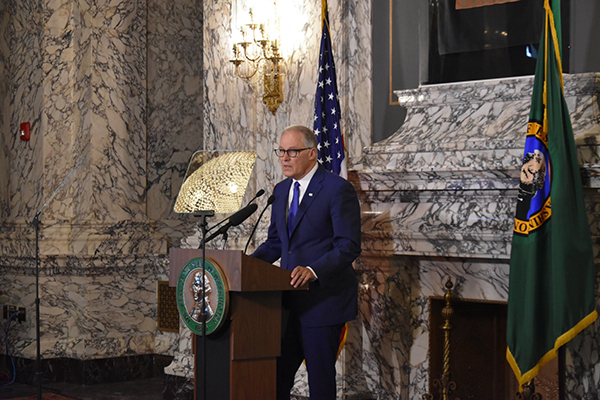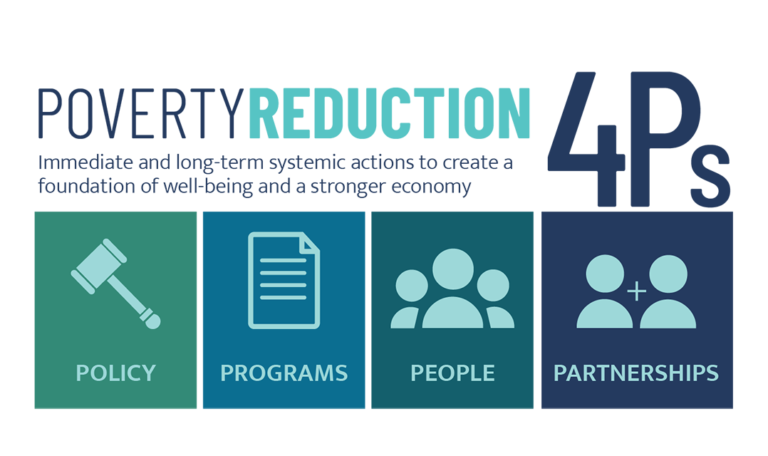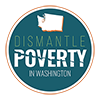
Note: This post was originally shared on Gov. Jay Inslee’s Medium page.
Year after year, Washington ranks among the best economies in the country, and yet existing policies and systems have not enabled all residents to thrive. An estimated 1.7 million Washingtonians still do not have enough resources or income to maintain consistent housing, access healthy food, pay utility bills or meet other basic needs — and that was before the COVID-19 pandemic further compounded these issues.
In December, Gov. Jay Inslee took steps to help address the matter as he proposed supplemental budget funding for 2022 that represents a significant investment — more than $1 billion,– to reduce poverty, address housing and provide resources to many Washingtonians left behind.
“In 2017, we created the poverty reduction group to develop a 10-year strategic plan to reduce poverty in our state,” Inslee explained at a press conference last month. “That group prioritized expertise and potential investments to reduce poverty, and the recommendations have informed many of the investment decisions that I’ve proposed to the Legislature in this budget. So I’m putting forward a package that will help nearly 1.7 million Washingtonians who can use a hand, who are struggling to make ends meet.
“My supplemental budget puts $248 million in state and federal funds toward poverty reduction. This package will help people find employment, it will empower folks to build assets and wealth, it increases educational opportunities and, importantly, it improves health.”
Along with investments to address poverty in his budget proposal, the governor also committed further to focusing on poverty reduction as one of his strategic priorities. He recently signed a new executive order designed in partnership with people and communities historically excluded from economic well-being.
“I’m issuing an executive order requiring the Department of Social and Health Services to chair a poverty reduction subcabinet to help us focus on this long-term effort,” Inslee announced in December. “This subcabinet will help pinpoint system failures in addressing poverty. It will recommend further budget and policy proposals and implement economic incentives. And so I am signing this with a flourish because we can do better in the state of Washington for our citizens.”
Cabinet officials from DSHS, Department of Children, Youth and Families, Department of Commerce and Employment Security Department comprise the Subcabinet on Intergenerational Poverty Reduction, together with participants from the Departments of Licensing and Labor and Industries as well as policy and budget staff from the governor’s office, the Office of Equity and others.
“We are grateful to see Governor Inslee continue to invest in this critical work that is foundational to advancing the health, wealth, and well-being of Washingtonians,” said Lori Pfingst, senior director of poverty reduction for the Department of Social and Health Services. “I am looking forward to working with the Legislature to bring it over the finish line.”
“Governor Inslee’s Poverty Reduction Work Group has again shown that when all voices — in this case, the voices of the PRWG’s Steering Committee of people living in poverty — are at the table and bold leadership is present, things can begin to change,” said Juanita Maestas and Drayton Jackson, Co-Chairs of PRWG, said in a statement about the new executive order. “The Steering Committee supports the executive order put out by Governor Inslee and emphasizes the need to fully invest in and put into action the recommendations to reduce poverty in Washington state.”
Other cabinet agency leaders also voiced their support for the new initiatives.
“As DSHS embarks on its next 50 years of providing essential human services to Washingtonians, we are grateful for Governor Inslee’s support of this vital work to help people reach economic stability to achieve their dreams,” said Jilma Meneses, DSHS’ secretary. “Many people in our state have not received these needed human services, either because they don’t know how to access them or don’t have the tools to access, which leads to more poverty and homelessness. Helping provide that access is critically important to our mission at DSHS. We have the opportunity to shape our agency for years to come, and to connect to the economic recovery of Washington state.”
Dr. Karen A. Johnson, the state’s first director of the Office of Equity, shared, “Equity requires distributing and prioritizing resources to people systematically excluded from making a good life for themselves and their families due to racism, discrimination or oppression. We applaud the governor for taking this bold action today and stand at the ready to work in solidarity to ensure all Washingtonians have equitable access to economic justice for the next seven generations to come.”

Summary
Additional highlights of Inslee’s proposal to reduce poverty include:
- Increase benefits and close access gaps to certain public assistance programs.
- Improve educational availability for children.
- Strengthen health supports across all ages.
- Build on the voices of those with lived experience and use an enterprise approach to reduce poverty.
The executive order and budget proposal support the state’s 10-Year Plan by building accountability in state government. These agencies’ shared work furthers the 10-Year Plan by supporting a stronger economic floor for Washingtonians through integrated eligibility and enrollment efforts as well as helping prevent residents from experiencing gaps and creating a more seamless, integrated continuum of care across child care, health and human services, education, and workforce development programs.
The Washington State Department of Commerce, Department of Children, Youth and Families, and the Employment Security Department remain leaders in these efforts.
“Reducing poverty is a core focus of Commerce’s work to strengthen communities throughout the state, and we welcome the opportunity to join the new subcabinet on Intergenerational Poverty Reduction,” said Commerce Director Lisa Brown. “Bringing together all of these key partners increases our ability to help our state’s most vulnerable residents and ensure an equitable economic recovery.”
“Multi-generational poverty is a complex challenge, and one that will require coordinated effort from multiple agencies,” added DCYF secretary Ross Hunter. “The pandemic laid bare some of the key challenges — ensuring that families have access to safe, convenient, high-quality and affordable child care so that they can go to work and access to needed supports like food, housing, medical care and education. The 10-year plan to eliminate poverty pointed out many of the places where we can act, and it’s up to us to do this in a highly effective way. At DCYF, we share Governor Inslee’s strategic priority and intend to engage deeply with the new subcabinet.”
“In 2022, we plan to build on momentum growing in the Economic Security for All program,” said Cami Feek, commissioner of the Employment Security Department. “Participants nearly tripled during the past year and more than 105 major partners joined our efforts to coordinate services to people living in poverty. Even during the first bad stretch of COVID, almost 200 participants found training and employment for in-demand jobs. We’ll do even better in 2022.”
“Poverty, combined with historical disinvestment in communities, limits the whole range of possibilities, capabilities and opportunities that a person, families and communities can access to achieve optimal health,” Umair Shah, MD, MPH, secretary, Washington State Department of Health. “Governor Inslee’s commitment to ending poverty in Washington state is necessary, and needed, if we are to transform our public health and health care systems in ways that help overcome obstacles related to the social factors that impact health.”
“Reducing poverty in our state is not about one easy solution, these are complex problems that require complex solutions. That is just one reason why I am so glad the Poverty Action Workgroup includes people with lived experience in this issue. Their recommendations help us craft policy that will truly have an impact on people’s lives,” Inslee said.
